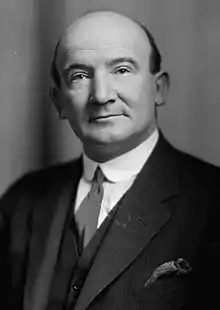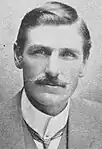1933 Buller by-election
The Buller by-election of 1933 was a by-election during the 24th New Zealand Parliament in the Buller electorate. It was held on Wednesday 22 November 1933. The seat had become vacant due to the death of Labour party leader Harry Holland who was also the leader of the opposition. Two candidates contested the seat, and it was won by Labour's Paddy Webb, who defeated Liberal-Labour candidate H. Ian Simson from Hawke's Bay.
| ||||||||||||||||
| Turnout | 7,048 (71.36%) | |||||||||||||||
|---|---|---|---|---|---|---|---|---|---|---|---|---|---|---|---|---|
| ||||||||||||||||
| ||||||||||||||||
Candidates
- Labour
There were four names nominated for the Labour Party candidacy. They were:
- Roy Holland, the advertising manager at the Maoriland Worker – son of Harry Holland
- John Smeaton, the president of the United Mine Workers Union
- Jim Thorn, a journalist and former President of the Labour Party (1929–31)
- Paddy Webb, a miner and former MP for Grey (1913–18)
Holland as well as Angus McLagan had declined to be candidates prior to the selection meeting. Webb was ultimately chosen as the official Labour candidate.[1]
- Lib-Lab
Horace Ian Simson, the former Mayor of Hastings and chairman of the Hawke's Bay Rivers Board, stood in the seat as a Liberal–Labour candidate. He campaigned on a platform of Seddon liberalism. He had previously stood as a candidate at the 1917 Hawkes Bay by-election.[2]
- Others
Edward L. Hills, a Christchurch based trade unionist, announced himself as an independent Labour candidate. He had recently stood at the 1933 Lyttelton by-election.[3] However, Hills withdrew his candidacy shortly before nominations closed.[4] The governing coalition government made up of the United and Reform parties did not contest the seat. It was the first time they had not stood a candidate in the by-election.[5]
Campaign
Webb, who had previously clashed with the leadership of the United Mine Workers Union over worker employment status, faced opposition from its members during the election. The union's secretary, Angus McLagan, was particularly opposed to Webb and stumped the coalfields in the constituency making speeches demanding that Webb be replaced by a genuine miners' candidate to represent Labour. Webb shrugged the criticism off and was defended by Labour MPs.[6]
Results
The following table gives the election results:
| Party | Candidate | Votes | % | ±% | |
|---|---|---|---|---|---|
| Labour | Paddy Webb | 4,799 | 68.10 | ||
| Liberal–Labour | H. Ian Simson | 2,249 | 31.90 | ||
| Informal votes | 343 | 4.86 | +3.14 | ||
| Majority | 2,550 | 36.18 | |||
| Turnout | 7,048 | 71.36 | -17.66 | ||
References
- "Mr P. C. Webb Chosen – Official Labour Candidate for Buller". The Star. Vol. LXIV, no. 895. 17 October 1933. p. 7.
- "The Buller Seat – Liberal–Labour Candidate". The Times. Vol. 114, no. 19076. 14 October 1933. p. 5.
- "Independent Candidate – Mr. Hills to Enter Field". Stratford Evening Post. Vol. II, no. 384. 16 October 1933. p. 5.
- "Buller By-Election – The Two Nominees". Evening Star. No. 21564. 9 November 1933. p. 11.
- "Buller By-Election – Nominations Close for Buller Seat". The Star. Vol. LXIV, no. 914. 8 November 1933. p. 9.
- Richardson, Len. "Webb, Patrick Charles". Dictionary of New Zealand Biography. Ministry for Culture and Heritage. Retrieved 8 September 2010.
- "Buller By-Election". The Press. Vol. LXIX, no. 21026. 30 November 1933. p. 8. Retrieved 30 August 2015.

